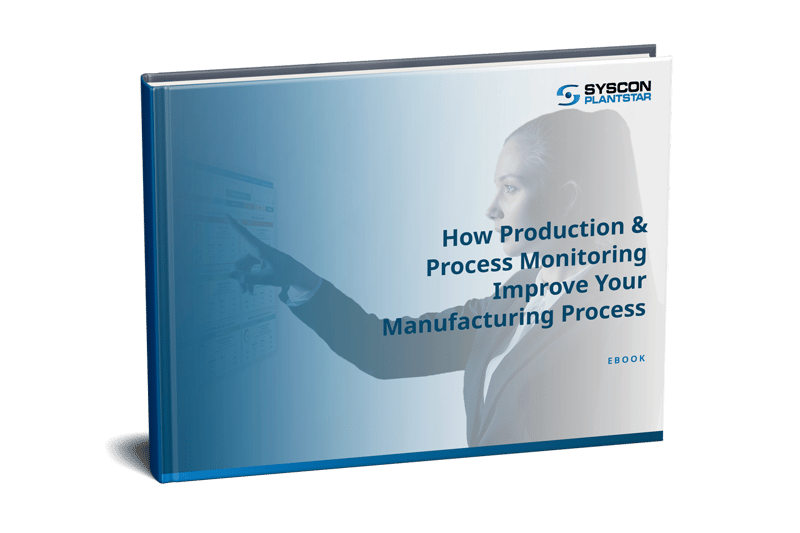SYSCON PlantStar BLOG
Successfully Implement Paperless Manufacturing with MES Technology
Mar 24, 2023 2:47:00 PM / by PlantStar Team

The manufacturing process is complex and ever changing. Historically, personnel have tracked the progress of different jobs via inefficient manual methods like spreadsheets, notepaper, and even sticky notes. Industry 4.0 solutions like cloud, the internet of things, and artificial intelligence make it possible to streamline those processes. To take advantage of recent advances, however, manufacturers must collect information in a central location. A manufacturing execution system (MES) is the right tool for this job.
Implementing new technology requires a delicate balancing act. When you’ve developed business processes that keep goods flowing and revenue arriving, it’s important to continue these processes while introducing new digital manufacturing solutions that supplement or replace legacy paper methods. To meet that challenge, producers first need to set reasonable objectives. Digital transformation takes time, effort, and money; no manufacturer moves from the old to the new over night. The right building blocks must be in place before starting any project, and a great way to begin is by improving data access.
Break down data silos.
The old way of doing business created inefficiencies. Previously, supply chain, manufacturing, and back-office information was siloed, available only in one application used by a specific department. As a result, other groups that would benefit from the information lacked access to it. An MES plays a foundational role in breaking down such barriers. MES software captures, cleans, organizes, and contextualizes information. It becomes the central information hub and usually includes integration bridges to collect data and share it with other systems. With it, data from production processes can be combined with operational data from enterprise resource planning (ERP), supply chain, customer service, and other enterprise systems. The change provides managers much needed visibility.
Move slowly when retooling manufacturing processes.
Paperless platforms feature interactive screens, dashboards, and various reporting filters, giving managers access to real-time data and dramatically altering the way the business functions. Enterprises need to carefully consider the potential impacts of adjustment, however. Change brings uncertainty, which breeds doubt, which can lead to employee resistance. Additionally, unexpected issues tend to arise any time something new is put in place. Consequently, when first deploying new paperless technology, suppliers should start small, keep alterations simple, and temper expectations. Flexibility and a willingness to make adjustments as the transition takes shape minimizes potential missteps and increases the likelihood of a successful upgrade.
Invest in training.
New digital solutions have tremendous potential, but they also are different from what employees have been doing. Therefore, enterprises need to invest in training programs and help workers gracefully migrate from the old to the new way of operating. You can initiate training programs in cooperation with your MES software supplier or with third parties who specialize in this field. Establishing internal train-the-trainer programs enables the company to build up a pool of individuals who understand the new solutions and can step in and smooth out any rough patches.
Improve productivity & product quality.
With paperless manufacturing operations, new data is captured automatically from machines, people, and systems. Dashboards enable managers to monitor actual production process conditions and machine performance in real time. They can access current machine state by job, hour, operator, or globally to make decisions quickly. In the past, there was an inherent lag in the decision-making process as paper reporting was recorded, collected, aggregated, distributed, and analyzed. Digital transformation results in less filling in forms, less manual tracking, and more time for operators and technicians to find ways to boost both productivity and product quality.
Reduce costs.
The average office worker consumes 10,000 sheets of paper per year. In addition to traditional notepads, manufacturers rely on technical papers such as thermal paper printouts, large-format green bar paper, trouble ticket cards, and other special materials. The usage strains natural resources, increases pollution, and costs money. Because these costs are often lumped in with other materials, their financial impact may not be crystal clear. However, such investments are significant, and moving from paper to paperless processes defrays these ongoing expenses.
Improve accuracy.
Human error is a big risk when manually distributing information via paper documents. With paper, the possibility of work getting overlooked, messed up, or forgotten is greater. In complex manufacturing environments, data points are sometimes miscategorized due to operator bias. Events on the shop floor such as unplanned downtime, personnel issues, or materials delivery issues translate to lost revenue. Human error negatively impacts scheduling, communication, and customer service. In a paperless manufacturing environment, changes are transmitted immediately, visible to every party involved, and accurate, reducing error and the associated unnecessary expenses.
Get started with a strong MES.
What do manufacturers need to do to realize these benefits? First, they must recognize the importance of consolidating information. Next, they need to find a strong MES to serve as a central repository. Such as a solution should support both production and process monitoring. As they take advantage of digital possibilities, manufacturers need to recognize that the human element is often tougher to overcome than the technical ones. Consequently, they need to invest in their employees, move slowly, and be flexible.
For more tips on optimizing operations in your manufacturing facility, subscribe to the SYSCON PlantStar blog!

Featured E-Book
Unlock the full potential of your manufacturing process with our ebook, "How Production and Process Monitoring Improve Your Manufacturing Process." The manufacturing industry is constantly evolving, and traditional manual methods are no longer efficient. Embrace Industry 4.0 solutions like cloud, the internet of things, and artificial intelligence to streamline your processes. But to succeed, you need a central information hub like a manufacturing execution system (MES). Break down data silos, move slowly when retooling, invest in training, and improve productivity, product quality, and accuracy. Reduce costs and make the transition to paperless manufacturing. Discover more valuable insights by downloading the ebook!
Topics: MES hardware
Subscribe to Email Updates
Posts by Topic
- Manufacturing Execution Systems (34)
- manufacturing solutions (16)
- MES 101 (12)
- Industry 4.0 (10)
- improve efficiency (9)
- mes software (9)
- mes solutions (9)
- Plastic Molding (8)
- Plastics Technology (8)
- Shop Floor Production (8)
- MES hardware (7)
- digital transformation (7)
- Reduce scrap (6)
- data-driven-decisions (6)
- lean manufacturing (6)
- process monitoring (5)
- product quality (5)
- Medical molding (4)
- lights-out manufacturing (4)
- manufacturing dashboard (4)
- production monitoring (4)
- Shop Floor Safety (3)
- supply chain management (3)
- ERP integration (2)
- Injection Molding Technology (2)
- defect collection (2)
- machine mes (2)
- process variables (2)
- digital strategy (1)
- labor gap (1)
- throughput (1)


